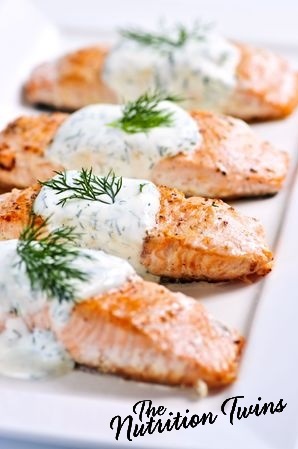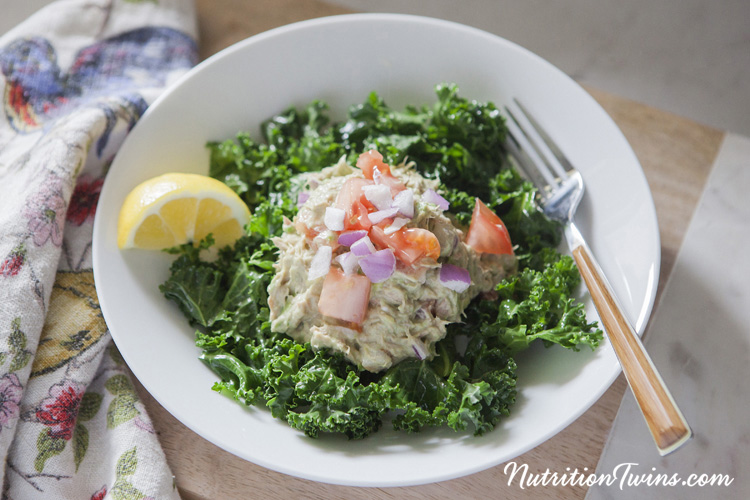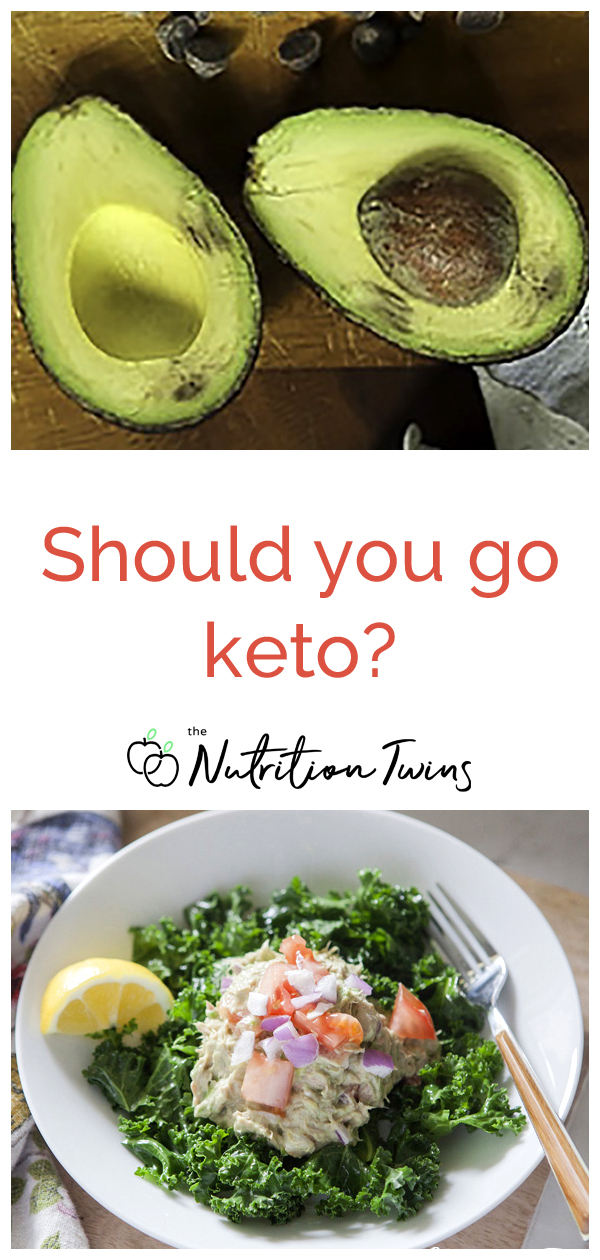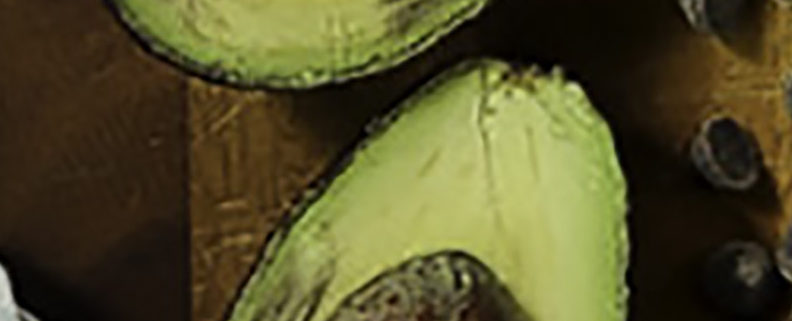As registered dietitian nutritionists, we’re always keeping our eyes on the latest trends in the nutrition world, and one thing we keep seeing pop up is the keto (aka ketogenic) diet.
Many of you have been asking if you should give the keto diet a shot, since it seems like everyone has a friend, coworker, or family member that’s on the keto diet and loving it! After all, even a couple of our guy friends who swore they’d never diet, have been tempted and admitted that they just may try this since the high fat and protein diet appeals to them. So we figure it’s about time we put our two-cents in and talk about the ins and outs & ups and downs of the keto diet!
Here are some of your most frequently asked questions about going keto, and our take on the diet as a whole, starting with the facts about the diet: Psst… check out our healthy & decadent Avocado Chocolate Pudding (have just a couple bites and it may even fit on the keto diet!)

What is the keto diet, and why is everyone suddenly going into “ketosis”?:
The keto diet is a low carb diet where your body produces ketones to be used as energy instead of using carbohydrates for energy. When you eat a diet that isn’t as low in carbs, your body uses carbs for energy and uses fat for other things like carrying fat-soluble nutrients, lining your body’s cells, and more.
When you cut out most carbs, your body can no longer rely on carbs as a source of energy and gets shocked into a state of “ketosis,” where your body converts the fat you’re eating in place of carbs into energy.
The goal of a keto diet is to force your body into ketosis, which some studies show can help promote weight loss, lower blood sugar, increase insulin sensitivity in diabetics and improve cognitive function. So naturally, many people are trying this diet for the alluring possibility of losing a few pounds. While the research is conflicting on whether going into ketosis itself can cause long-term weight loss, the fact is that many people do lose weight on this diet simply because it cuts out a large amount of foods– most carbs!—and because they are eating more whole foods and less packaged and processed foods.
Any diet that cuts out a food/ or many foods, especially foods that people tend to overeat, will generally result in weight loss. Whether or not the diet is sustainable and/ or healthy is something else to consider.)
In order for your body to stay in ketosis, you’d have to eat about 70% of your calories from fat, 20% from protein, and 5% from carbs, consistently.
Consistency is key with keto – if you slip up and fall out of that fat/protein/carb range, your body likely won’t be in ketosis anymore—and many of the associated health benefits slip away!
How can I avoid overeating while on the Keto diet?
No matter which diet you’re on, planning is an important part to being healthy. However, since the keto diet falls so low in nutrients since so many healthy foods and food groups are eliminated, it’s especially important to plan your meals when you’re on the keto diet.
Also, if you are doing the diet to truly reach the state of ketosis, you do have to plan to limit carbohydrates—so you can’t simply just grab a piece of fruit when you’re hungry or you won’t be in ketosis. You definitely should pick a start date and make sure you’ve set up your pantry and fridge for success.
Choose foods like eggs, avocados, plain Greek yogurt, low-carbohydrate vegetables, salmon, mackerel, anchovies, pumpkin seeds, cashew nuts, macadamia nuts. Ideally, you should talk to a registered dietitian (like us) to help you plan before you start the diet, it’s not easy to do it alone.
Plus, you may want help tracking your diet to make sure you are reaching the ideal ratio of protein, carbs and fat for the keto diet—70% calories from healthy fats, 20% protein and 5-10% from carbs.

(Use full-fat yogurt or sour cream in our Lemon Dill Salmon recipe for a keto-friendly option!)
But what about healthy fiber? Are fruits & veggies out?
Fiber is very important in any diet for regularity, gut health and disease prevention. It’s very difficult to meet the recommendations to get at least 25 grams of fiber a day when you’re following a keto diet because keto diets are extremely low in the foods that contain fiber (fruits, vegetables, beans and whole grains). Fiber also contains prebiotics to help keep your digestive tract healthy, so you should try to get it through nuts, avocados and non-starchy vegetables, herbs and spices, and berries if they fit in your carb limit.
Fruits are very controversial among keto followers. Most fruits are too high in carbs to eat on the ketogenic diet, but small amounts of berries are OK because they are lower in carbs than other fruit and high in fiber. Raspberries and blackberries are a good source of fiber and they’re packed with antioxidants that help to reduce inflammation and fight against disease.
Non-starchy vegetables (think leafy greens and most green veggies and cruciferous veggies like broccoli and cauliflower) are generally low in calories and carbs, and in order to stay in the tight guidelines to keep carbohydrate levels down, choosing them while also paying attention the to the grams of carbs is helpful.
Veggies with 1 g of carbs per cup (like spinach) can be compared to others that can range to 8 grams per cup. In general, the recommended veggies are leafy greens and most green veggies and cruciferous veggies like broccoli and cauliflower, kale, as well as peppers, asparagus, fresh herbs and spices, tomatoes and onions, celery, zucchini, Swiss chard and cabbage.

(get the recipe for this avocado tuna salad with kale when you sign up for our 21-Day Body Reboot!)
What kinds of fat should I eat on the keto diet?
Avocados! The monounsaturated fat is heart-healthy and avocados are packed with vitamins and minerals. Fattier nuts and seeds are great too—pumpkin seeds, macadamia nuts, walnuts and cashews. Salmon, mackerel, sardines and anchovies are heart healthy options that are rich in inflammation-fighting omega 3s (and super important to off-throw the balance of all of the high saturated fat foods, as well as the inflammation they create in the body). Olive oil is a heart-healthy oil to use as well.
Ok, but do I have to drop my skinny martinis?
Yep – alcohol is a no-go on the keto diet.
When you drink alcohol, your body views it as a toxin and many body processes are temporarily stopped to process the alcohol in your liver, since your body’s priority is ridding toxins. This means fat burning is slowed, since you’re using fewer fatty acids to make ketones—which is obviously the opposite of the goal of people following a keto diet for fat loss.
You’ll also get drunk faster since your tolerance will be lower since your liver is metabolizing alcohol much faster since you’ll have no glycogen stores for the body to burn through first (glycogen stores are created from carbohydrates). The more drunk you are, the lower your inhibitions and the more likely you’ll be to fall off the very low-carb, keto diet. Plus, alcohol, like beer and cocktails have a significant amount of carbs, so that is something to take in to consideration.
Here are a few ideas of what keto meals might look like!
Curry Chicken Lettuce Wraps:—chicken, chili spice, curry powder, garlic, onions cooked in a couple of tablespoons of ghee, cauliflower rice, and a dollop of plain sour cream
Breakfast “bagel”: An avocado cut in half and filled with scrambled eggs and turkey bacon. Think of the avocado as the bagel.
Keto Salmon Salad: salmon, celery, mayonnaise, mustard, dill, walnuts, and avocado with mixed greens
So tell me, should I try the keto diet?!
Honestly, it’s not our cup of tea. And if you’re someone who drinks milk with your tea, it’s probably not for you either. 😉 In order to truly get the benefits of being in ketosis, you’d have to stay in ketosis. And that’s REALLY tough because that means continuously eating about 70% of calories from fat. Even something as simple as a chicken breast could be too high in protein without enough fat to keep you in ketosis, ruining any of the benefits you’d be getting from the diet in the first place! It’s also super difficult to get enough fiber while on the keto diet – and without adequate fiber, we’d be constipated all the time and our face would show it too 😉 as we’d seriously worry about our digestive health. The keto diet is so restrictive that we really wouldn’t enjoy eating with such intense restrictions, and we’re ALL about loving the foods that we eat!
If you’re looking to take charge of your health, we’d recommend trying something a bit more sustainable that still gets you results so you can enjoy more freedom with your food and keep eating the foods you love – all while still losing weight!
Both our 1:1 counseling sessions & Our 21-Day Body Reboot program do just that – you’ll learn how to make healthy choices and indulge in the foods you love while losing weight, and with our program you get to do it with support from us and alongside a community of motivated people just like you!




